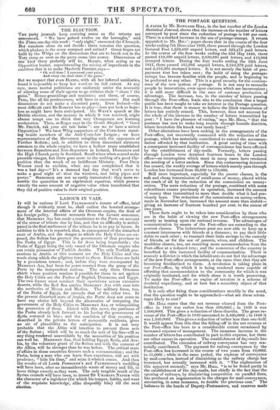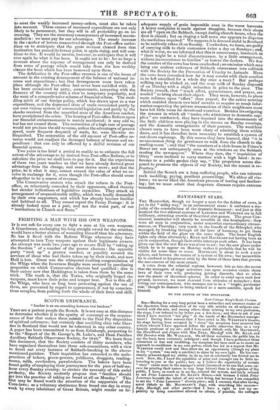THE POSTAGE QUESTION.
A raise. by Mr. ROWLAND RILL, in the last number of the London Statistical Journal, shows that the increase on the number of letters conveyed by post since the reduction of postage is 140 per cent. There is a marked increase in the use of postage-stamps. A return appended to Mr. Hire's paper showa that in the course of the four weeks ending 7th December 1839, there poSsed through the London General Post 1,359,439 unpaid letters, and 323,473 paid letters, In the course of the four weeks ending the 28d May 1840, there passed 410,399 unpaid letters, 2,630,895 paid letters, and 419,984 stamped letters. During the four weeks ending the 19th June 1841, there passed 485,986 unpaid letters, 2,340,379 paid letters, and 2,516,304 stamped letters. It is not merely the habit of pre- payment that has taken root ; the habit of using the postage., stamps has become familiar with the people, and is beginning to be preferred to any other. This is a good security for the continu- ance of the new system of postage. It is not easy to reconcile people to innovations, even upon customs which are inconvenient ; it is still more difficult in the case of customs productive of advantage. The increase, too, in the number of letters passing through the Post-office, leads also to the conclusion that a larger public has been taught to take an interest in the Postage question, It is true, that there is reason to believe the illicit transmission of letters has entirely ceased. This, however, does not account for the whole of the increase in the number of letters transmitted by post : " I have the pleasure of stating," says Mr. Lime, " that the postman has now to make long rounds through humble districts, where heretoibre his knock was rarely heard." Other alterations have been making in the arrangements of the Post-office, not necessarily connected with the reduction of the postage, which has materially contributed to extend the accommo- dation afforded by that institution. A great saving of time with a consequent increased facility of correspondence has been effected by the establishment of day‘malls. Formerly, letters passing through London were detained fourteen hours in the London office—an interruption which must in many cases have rendered the sending of a letter useless. Since this embarrassing detention has ceased, the weekly average of letters which merely pass through London has increased from 36,000 to 170,000.
Still more important, especially fot the poorer classes, is the safe and cheap transmission of small sums of money, placed within the reach of all by the reduction of the commission on money. orders. The mere reduction of the postage, combined with some subordinate causes previously in operation, increased the amount of money thus transmitted to more than double what it had pre- viously been. The reduction of the commission on money-orders, made in November last, increased the amount more than sixfold— giving an increase of fourteen hundred per cent. in the course of two years.
These facts ought to be taken into consideration by those who are in the habit of viewing the new Post-office arrangements merely as bearing upon the national revenue. The advantages of communication by means of the Post-office are extending to the poorest classes. The industrious poor are now able to keep up a constant intercourse with friends at a distance ; to pay their little debts to each other ; to transmit their little savings to the custody of friends, or for the use of parents, wives, and children. The wealthier classes, too, are receiving more accommodation from the Post-office at a reduced rate ; and the commerce of the country is benefited by this increased facility of communication. There is scarcely a district in which the inhabitants do not feel the advantage of the new Post-office arrangements, at the same time that they art becoming familiarized to them. A revolution is taking place in our Post-office, by which it is being rendered more capable of affording that accommodation to the community for which it was originally instituted, and for which alone it is worth preserving. To make the Post-office an engine of taxation is a scheme of doubtful expediency, and at best but a secondary object of that institution.
It is only after fixing these considerations steadily in the mind, that the question ought to be approached—what are these advan tages likely to cost ?
Mr. HILL states that the net revenue cleared from the Post- office in 1840 was rather less than 500,0001. ; iu 1839 it was 1,600,0001. This gives a reduction of three-fourths. The gross re- venue of the Post-office in 1839 amounted to 2,400,000/. ; in 1840 it was 1,340,0001. This gives a reduction of rather less than one-half. It would appear from this that the falling-off in the net revenue of the Post-office has been to a considerable extent occasioned by increased expense of management. The immense increase in the number of letters has contributed in part to this expense, but there are other causes in operation. The establishment of day-mails has contributed. The extension of railway conveyance has very ma- terially contributed. The payment for railway conveyance by the Post-office has increased in the course of two years from 10,000E. to 51,0001.; while in the same period, the expense of conveyance by mail-coaches, instead of diminishing as the railway charge has increased, has actually increased with it. "The explanation of this apparent anomaly, ' says Mr. lime, "is to be found partly in the establishment of the day-mails, but chiefly in the fact that the opening of railways, by diminishing competition on parallel lines, has produced an augmentation in the charges for mail-conveyance, amounting, in some instances, to double the previous cost." The balances in the hands of Deputy-Postmasters, and reserves made to meet the weekly increased money-orders, must also be taken into account. These causes of increased expenditure are not only likely to be permanent, but they will in all probability go on in- creasing, They are the necessary consequences of increased accota- Mbdittion : we must pay for our advantages. The steady increase in the number of letters transmitted through the Post-office autlin- kites us to anticipate that the grdas revenue deeded froth that institution has passed its lowest point, is again rising; and will con- tinue to the. It would be unwise, however, to anticipate that it Will ever again be what it has been. It ought not to be : for so large a revenue above the expense of Management can only be derived from rates of postage which would take froth the less wealthy classes the boon which has been bestowed upon them. The defalcation in the Post-office revenue is one of the items of account in the existing derangement of the balance of national in- come and expenditure ; but that derangement must have taken place although the Post-office had never been meddled with. It has been occasioned by petty, unsystematic, tampering with the finances of the country with a view to terhporary popularity, and the went of a comprehensive scheme of financial reform. The med- dling spirit of our foreign policy, which has drawn Upon us a war expenditure, and the depressed state of trade occasioned partly by our own vicious system of commercial legislation and partly by the shocks received from the unsettled state of the American market, have precipitated the crisis. The bearing of Post-office Reform upon our financial embarrassments is merely accidental : it may add to, but has not caused them. The restoration of a high rate of postage would not produce the old revenue, unless the advantages of greater speed, more frequent despatch of mails, &c. were likewise re- linquished. The restoration of the old amount of Post-office re- -fiddle would not readjust the deranged balance of income and ex- penditure : that can only be effected by a skilful revision of our financial system.
Two years is too brief a period to enable us to estimate the full extent of the advantage to be derived from Post-office Reform, or to calculate the price we shall have to pay for it. But the experience of these two years teaches us that we have already derived great advantage from the change, and must derive more ; and that the price, be it what it may, cannot exceed the value of what we re- ceive in exchange for it, even though the Post-office should cease altogether to be a source of revenue.
The Conservative orators who attack the reform in the Post- office, so reluctantly conceded by their opponents, afford thereby but slender indications of legislative capacities. They attack an arrangement of unquestionable utility, which was loudly demanded by their own supporters, and which has already become familiar and habitual to all. They cannot repeal the Penny Postage : it is already looked upon as a part, and not the worst part, of our " institutions in Church and State."



























 Previous page
Previous page